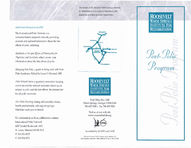Additional Resources on PPS
The International Polio Network is a consumer-based, nonprofit network, providing accurate and updated information about the late effects of polio, including:
Handbook on the Late Effects of Poliomyelitis for Physicians and Survivors, which covers basic information about the late effects of polio.
Managing Post-Polio, a guide to living well with PostPolio Syndrome. Edited by Lauro S. Halstead, MD
Polio Network News, a quarterly newsletter keeping survivors and the network informed about issues related to polio and the late effects. Recommended for all polio survivors.
Post-Polio Directory, listing self-identified clinics, health professionals, and support groups. Published each year in March.
For information on these publications contact: International Polio Network 4207 Lindell Boulevard, #110 St. Louis, Missouri 63108-2915 P: 314-534-0475 F: 314-534-5070
The mission of the Roosevelt Warm Springs Institute for Rehabilitation is to empower individuals with disabilities to achieve personal independence.
ATLANTA
. . . . . . . . . . . ., ~_ioiooj~ MACON
MANCHESTER
ROOSEVELT
WARM SPRINGS INSTITUTE FOR REHABILITATION
Post Office Box 1000 Warm Springs, Georgia 31830-0268 706-655-5000 Fax 706-655-5011
Visit us at our web site: www.rooseveltrehab.org
Accredited by: JCAHO and CARP
Alternate formats of this brochure may be obtained by contacting the Roosevelt Public Relations Office at 706-655-5668.
ROOSEVELT
WARM SPRINGS INSTITUTE FOR REHABILITATION
:JJsl- :JJluo
:JtiDlfpra m
The Post-Polio Program at the Roosevelt Warm Springs Institute for Rehabilitation is recognized as a specialty center by the International Polio Network and is one of the largest post-polio clinics in the United States. The Roosevelt Institute has a long history of providing treatment to people with polio dating back to 1927 when the Institute was established by Franklin Delano Roosevelt. The Post-Polio Program provides evaluation, treatment, and education about managing health problems related to the late effects of polio or other symptoms resulting from chronic overuse of polio-weakened joints and muscles.
Experts suggest that Post-Polio Syndrome is related to neurological overuse. It can affect those who survived acute polio 30 to 40 years ago, with new muscle problems, fatigue or other symptoms. There is currently no cure for PPS; however, there are ways to manage and to reduce the difficulties related to performing routine activities. Learning to pace daily activities, making life-style changes, avoiding activities that cause pain, and regular rest periods can help. Periodic basic medical attention, good nutrition, avoiding alcohol and tobacco, and an approved exercise program can help with the management of PPS.
Symptoms May Include:
Fatigue or flu-like exhaustion Muscle and joint pain New muscle weakness to either affected
or formerly affected muscles Breathing or swallowing difficulties Muscle cramps Problems sleeping Intolerance to cold temperatures
Services Include:
The Post-Polio Clinic provides a two-day evaluation performed by the Clinic Director, who is a board-certified Physiatrist and an interdisciplinary team of healthcare specialists including a Physical Therapist, Occupational Therapist, Speech-Language Pathologist, Psychologist, Respiratory Therapist, and Orthotist. Evaluation will include a medical evaluation, muscle test, functional evaluation and therapy program, if needed. Recommendations for bracing, adaptive aids and home exercise or therapy programs may be made. Referral for additional medical services including cardiology, pulmonology or neurology may also be necessary.
For An Appointment Contact:
Lorell Neely, Medical Secretary 706-655-5322 Fax: 706-655-5344 e-mail: mlneely@dhr.state.ga.us
Anne C. Gawne, M.D., Clinic Director 706-655-5322 Fax 706-655-5344 e-mail: acgawne@dhr.state.ga.us
Dr. Gawne received her medical training at the Uniformed Services University in Bethesda, Maryland, and did her residency at the National Rehabilitation Hospital in Washington, DC. She co-authored Post-Polio Syndrome: Pathophysiologt) and Clinical Management with Lauro S. Halstead, MD, National Rehabilitation Hospital, one of the foremost authorities on Post-Polio Syndrome. Before coming to Roosevelt Warm Springs Institute for Rehabilitation, Dr. Gawne was with National Rehabilitation Hospital in Washington, D.C., and Spain Rehabilitation Center at the University of Alabama in Birmingham.
FOR Post-Polio Support Group meets each month on the 3rd
Saturday at 10:00 a.lIl. If interested in membership or newslet-
ter, write to FOR Post-Polio Support Group, Roosevelt Warm Springs Institute for Rehabilitation, PO. Box 1000, Warm Springs, Georgia 31830-0268.
